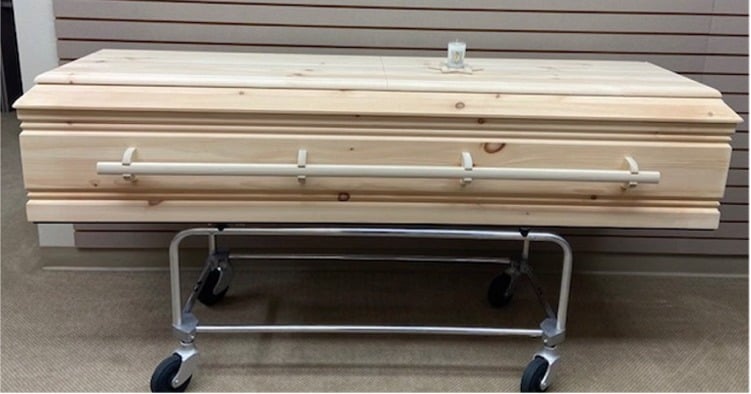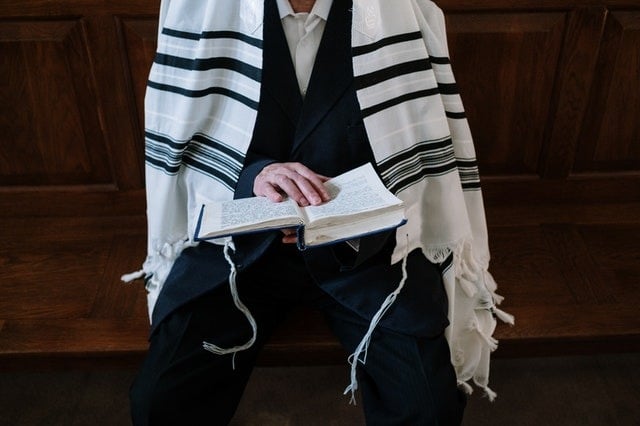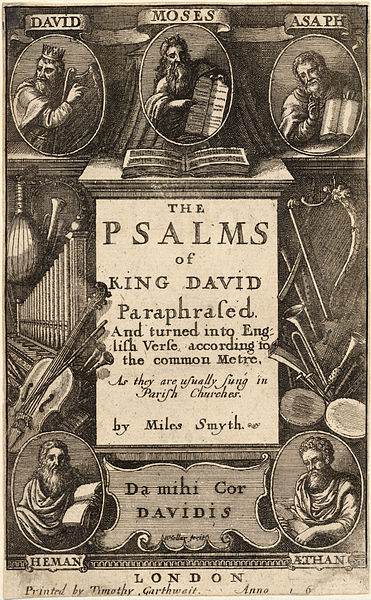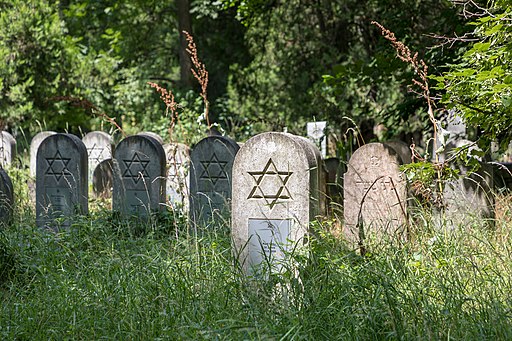
Religion Behind the Scenes spotlights the less discussed, but no less crucial, tasks that keep religious communities running, and the people who make it all happen.
In many religious traditions, the passing from this life to the life-beyond is considered a sacred event. And while it is commonly believed that the soul continues to live on after the death of the physical body, nonetheless, there is often a sense that the body of the deceased should be treated with reverence and respect. In Judaism, one of the ways to manifest that respect is to utilize a shomer or “guardian” of the body of the deceased, until it can be buried.
Sharon Bushman is the managing funeral director at Sinai Memorial Chapel’s Lafayette, CA branch, and one who has served many times as a shomeret for the deceased in the Jewish community in the Bay Area. In this fascinating episode of Religion Behind the Scenes, Sharon tells us about the responsibilities of shomers, why this work is important in Judaism, how it’s accomplished, and what serving as a shomeret has meant for her own spirituality and life.
Knowing that many who will read our conversation will not be practitioners of Judaism—and will likely never have heard of a Shomer (show-mare)—could you explain a bit about what this job is and what it entails?
Sure. Let me start by explaining how this job came to be, and then I’ll tell you a bit about how it has evolved into what it is today.
So, the Hebrew word shomer actually translates into English as “guard” or “guardian.” And the purpose of a shomer is to guard the body of the deceased until it can be buried. Shemira—which means “guarding” or “watching”—is the act of watching over the body. In Judaism, a male guardian of a decedent is called a shomer and a female guard is a shomeret.
Now, in biblical times, when the Jewish people were a desert people, it was necessary to guard the body of a deceased person until a hole could be dug in which to bury it. You wouldn't want to leave a body out in the elements unprotected overnight. There were animals. There could be other tribes who might seek to desecrate it, or what have you. So, it was necessary to have someone stay with the body, to guard it, until it could be buried. Thus, the ancients created a position to serve that purpose or need.
Nowadays, we clearly don't really have that particular need. We're not worried about wild animals preying upon our loved ones in the middle of the night, because we don’t leave them out exposed to the elements. However, Jews generally still feel a need to have someone stay in the building with the deceased—to have someone stay with the body at all times, from the time of the person’s death until he or she can be interred.
This is very important in Orthodox and Conservative Judaism. But, to some extent, you see this in the Reform tradition and, to a lesser extent, even among Reconstructionist Jews. There has been a growing movement or renewed interest in these things in recent days.
So, what does the shomer do while guarding the body? Does he or she just sit there? What does this “guarding” of the body look like?
Well, there are a number of things which might take place. So, for example, it's traditional to read psalms to the deceased, which are thought to be soothing to the soul. The way that it was explained to me is that the soul takes a while, after the person dies, to fully transition. Some people say that transition takes place on the fourth day, some people say in a week—depending on which rabbinical sources or Talmudic sources you're looking at.
What I was told when I started doing this work was that, just like when you have a little baby and you're putting your baby to sleep at night, some babies drift off really peacefully, quickly and easily. And some, like mine, are really fussy take a lot to actually get them down. When the soul leaves the body and is making this transition, some souls transition very easily, while others have a more difficult transition. We don't know which are which. So, just like for a fussy baby, you might sing lullabies and try to soothe it, to help it drift off more easily and peacefully; with our dead, we sit and we read psalms, which are thought to bring comfort to the transitioning soul, to ease it on its journey.
Oh, that's beautiful. Are there particular psalms one would read, or just generally anything from the Book of Psalms?
Oh, generally, I think most just read from wherever in the psalms. Of course, the 23rd Psalm is always a popular one, you know. And I try—if I have a little bit of background on the person who has died—to pick things that I think they might resonate with them. And truthfully, sometimes you might read things which are not exactly within the tradition of the deceased. So, in some cases (in addition to the psalms) we have taken the liberty of reading other readings that we thought might be comforting to the departed. For example, we had a young man in his late teens or early 20s, and his family said, “You know, he really loved Harry Potter.” So, we read some Harry Potter interspersed with the psalms. On another occasion, we had a little girl who tragically died in a plane accident, and we read some Dr. Seuss and some Shel Silverstein, interspersed with some psalms.
So, the person performing shemira stays up all night, tending to the body—sitting next to the closed casket—reading to it?
Yes, someone stays up with the body each night. And yes, it is typically a closed casket. It's traditional in the Jewish religion, by and large, that once the casket is closed, you do not reopen it. Of course, Russian Jews have different traditions (that they brought from Russia), and they are more likely to have an open casket. But, during shemira, the casket would remain closed.
How quickly after death do most Jews wish the deceased to be buried?
ASAP. We have a lot of variation in Jewish tradition. So, in Israel, normally it's done within 24 hours. The legalities and processes in Israel are very minimal. So, they can do things quickly. Here, in the United States, we have to work with the doctors to get the cause of death and with the health department to obtain a burial permit. And here in California it often takes about two working days for the paperwork to all get approved. So, we tell people we are committed to following Jewish tradition in doing the funeral as quickly as possible, but we also have to follow California law as well. The hardest ones are when someone who's very orthodox dies on a Thursday night or Friday morning, and we're going into a holiday weekend. We might be able to get started on the paperwork on Friday, but the health department is going to be closed on Monday (for the holiday). So, they're not going to be reopened until Tuesday—and they're going to have a backlog because they were closed for the holiday. So, somebody Orthodox who dies on a Thursday night or Friday morning probably won't be buried until Tuesday or Wednesday, which is not really what the family wants to hear. But it's the reality of what we have to do in order to satisfy the law.

So, does there need to be a shomer with the body each night during a situation like you just described, where it might be four or five days before the body can be buried?
Traditionally, yes—even if it takes several days. However, since the funeral home staff is around during the day, there isn’t a need to bring someone in to sit with the body during the daytime. However, each night numerous people will need to come in—usually in two-hour shifts—and sit with the body, even if it takes five days to get the deceased buried.
Out of curiosity, does it matter whether the shomer is male or female, contingent upon the gender of the deceased person they are guarding?
No, it doesn’t matter. Of course, for the traditional ritual washing and shrouding of the body of the deceased, it is separated by gender—women tending to the body of a woman and men tending to the body of a deceased man. That’s largely for purposes of modesty and showing respect to the deceased. But, when the person is serving as a shomer, the body has already been shrouded and casketed, so anybody (regardless of the gender of the deceased) can do it, even relatives of the deceased are permitted to act as shomer for their loved one.
So, which is more common? Is it more typical for a relative to act as the shomer, or is it usually somebody unrelated to the deceased that volunteers?
I would say that it is more often someone outside of the family. Some congregations have their own chevra kadisha, or "holy burial society." The chevra kadisha, in a congregation, are the ones who have formed a committee so that, when a congregant dies—if they want the traditional washing and shrouding, or if they want a shomer—volunteers from their congregation will come and perform that service for them, rather than the staff of the funeral home. Though, in Jewish funeral homes like ours, someone is always available to perform that service, where needed.
Could a non-Jew ever serve as a shomer for a Jew who has died?
No. And that's just a religious thing. I can't tell you the whys and wherefores, but it's something that Jews must do for each other.
As the director of a funeral home which largely serves the Jewish community, how often do you serve as a shomeret?
Well, of course, I have done it outside of being a funeral director, because I am a member of my congregation’s chevra kadisha. So, before I was a funeral director, when my congregation had a need, I would on occasion volunteer to do that. But our staff does this with some frequency as well.
If a congregation's chevra kadisha is volunteering to be the shomers, it's common for them to do so in two-hour shifts, rather than one person staying all night. If the funeral home staff is performing shemira, we will typically have one staff person here for the entire night.
What initially got you into serving as a shomeret? And what motivates you to perform this service?
My whole entry into the funeral profession comes from my personal background. I lost my father at age seven. He had a brain tumor, and it was just a matter of time. Medical technology back then was not what it is now. And I was raised in the equivalent of what would now be considered a Modern Orthodox family. So, although I was allowed to go to my father's funeral—go to the burial—I wasn't allowed to participate in any of the ritual because I wasn't 13 yet, and I wasn't a boy. And that definitely left some scars. I was also blessed to have a very large family. So, by the time I was 20, I'd probably been to more funerals than most people who don't work in the funeral profession. Since my first funeral experience—my father’s funeral—was not the best of experiences, it was my observation through the years that some funerals went really well, and some not as well. And it mystified me as to how you could make a really bad day even worse for the participants. Like, how do you blow a funeral?! So, my goal (as a young person) was to go into this field and try to make it better for people; to try to actually meet everybody's needs and make a horrible day as smooth as such a day could be. So, that got me into the funeral industry, and it got me into serving as a shomeret.
I’m not currently a very religiously observant person. I mean, I was raised with a lot more than I currently practice. But I feel very connected to my Judaism through the work that I do. And I think that the thing that I try to bring, when I'm acting as a shomer—aside from just reading the psalms and doing the things that you're supposed to do—is that I really try to be present for the departing soul. Now it's almost never anybody that I knew personally. But I just want that soul to know that there's someone there—that they're not alone through whatever they're going through, easy or difficult. I'm just there for them, and my spirit is available for them in whatever way I can be helpful.
As a follow up to that, could you expound on what you feel is the most sacred side of serving as a shomer?
I just think it's a real honor to be able to “soul-sit,” if you will. I feel like there's something so sacred about being present in those liminal times. For years, I thought I wanted to be a birth doula. And while I'm not a “death doula,” I am a “transition doula.” I'm not sitting with the person as they're dying, and I'm not doing hospice work or spiritual counseling—as someone is passing or dying. It's the next part of the transition that I’m involved with and, not to sound weird, but from the time I was really young, I've always had a connection with souls that have passed. People visit me, so I just feel comfortable in that realm. I’ve always felt comfortable in that realm. And I just think, whether somebody wants me there or not, just knowing there's someone there in case I am needed is a nice thing to be able to do.
Have you had any unusual experiences serving as a shomer?
Oh, occasionally you hear sounds in the night; but I am not overly superstitious. But I will say that there are some individuals whom I've sat shemira for where it just stuck with me more. There was something about that person, where I think about them from time to time. It’s not everybody that I sit for, but there are a couple who have really stuck with me and I’m not exactly sure why. On some level, there was just some connection with that person.
In terms of the families, the work of the shomer is, I don’t know… “secretive” is not the right word; but nobody knows who the shomers are. That’s because taking care of the deceased is thought to be the highest mitzvah (the highest commandment or religious duty) one can do. You're giving to someone who can never repay these kindnesses. And, in keeping with that, in no way should the family of the deceased feel obligated or encumbered. It's something that’s just pure giving.
So, I’ve got a funny story related to the “secret” side of this work. Years ago, there was a gentleman who would serve as a shomer for our office. He had done it for many years. He happens to be gay. And we were having our annual luncheon, celebrating staff and accomplishments for the year. And he had reached like a 20-year milestone of acting as shomer. And so, our boss gets up and says, “I want to honor Steve. This is his 20th year as a shomer.” And Steve said, “Oh, my gosh, you outed me.” And my boss got really embarrassed, like “Oh, my God. What did I say?” Like, everybody knows that this man is gay. It's not a secret, you know? And Steve then said, “Nobody knows that I’m a shomer. You outed me as a shomer!” We got quite the laugh out of that. Anyway, the point is, you do this work because you do it, and not for the glory or accolades. It is rewarding, but in a very private and personal way. It’s not public. And you don’t want people to know you’re the one performing this service.
What’s the most common thing, positive or negative, that a shomer might run up against performing shemira?
The positive, I think, would be that the people who perform this service truly get a lot out of it personally. You’re serving, but it doesn’t really feel so much like a sacrifice. And, for those who work during the day and may not be available to do other types of volunteer work, if you're willing to give up a couple hours at night, it's a really nice way to participate in community.
Are there aspects of working as a shomer that might surprise people?
Probably how easy it is. You know, if you don't mind missing a few hours of sleep, then there’s really no downside to it. You're doing good. It's very quiet, peaceful, spiritual work. And, you know, aside from people who might think it's creepy being in a funeral home or creepy being near a decedent, I think those are the people who wouldn't volunteer to do it anyway.
What else should a person know about the work of shomers?
Well, traditionally, it's done by somebody who's observant. Orthodox Jews really only want someone doing this who is at their same level of observance. Which is understandable. But it does pose some obvious challenges.
Are there misconceptions about the work of a shomer that some people might have?
Really, it's a pretty limited scope responsibility. So, probably not “misconceptions.” I think that most people just don't know that the job even exists. I think even within the Jewish community, knowledge about this work is limited. Like I said, in recent times, there has been a somewhat growing interest in the traditional washing and shrouding of the body of the deceased, and in doing shomer work—largely through Kavod v'Nichum, which is an organization that was started to do training in all things Jewish associated with death and dying. They offer workshops and so forth, and they provide education in this aspect of Judaism.
So, what’s the biggest challenge you see facing this work in the years to come?
The biggest issue is going to be the continuing challenge to raise awareness of the need for this service. Finding people to do this service is not so easy because it's a very “on call” kind of job. Not every Jew that dies requests to have a shomer to sit with them, but our funeral home will sometimes have ten nights in a row where we need a shomer, and then perhaps two weeks where we don’t need any. So, if congregations don’t provide their own shomers, our staff has to step in. And even if a congregation does have its own shomers, we still have to have a staff person in the facility to open and close the door and, in case somebody misses a shift, there needs to be someone there to cover that.
The people who tend to do shemira tend to be older retired people whose children are out of the house, and who don’t have to get up in the morning. However, many of them are a little less inclined to want to drive at night, often feeling like they can’t see that well to make the trip to the funeral home and back in the dark. So, that poses a challenge as well.
I personally think it would be a great job for a Jewish college student because you could come, you could do some, then study in between. You're up all night anyway, you’re young, you have the energy. You do a mizpah while you’re at it. You can do something for the community.
So, I think our biggest challenge is keeping an awareness of the importance of this work and finding people who are willing to do it in the future.
How is this work changed you for the better or influenced you spiritually?
That's a really good question. I think it's just allowed me to continue a spiritual connection in a way that resonates for me personally. Like I said, I'm not one to go to Saturday services on a regular basis. I do holidays and other things, but I find serving as a shomer spiritually meaningful and fulfilling. I really enjoy the quiet time with the spirits or souls.
Interview conducted, transcribed, edited, and condensed by Alonzo L. Gaskill.
ABOUT ALONZO L. GASKILL, PH.D.
Alonzo L. Gaskill is an author, editor, theologian, lecturer, and professor of World Religions. He holds degrees in philosophy, theology/comparative religion, and biblical studies. He has authored more than two-dozen books and numerous articles on various aspects of religion; with topics ranging from world religions and interfaith dialogue, to scriptural commentaries, texts on symbolism, sacred space, and ritual, and even devotional literature.
7/13/2022 10:02:38 PM







